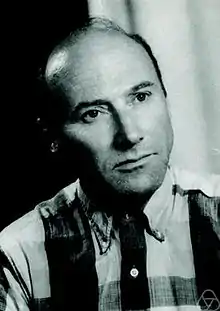Rudolf Haag
Rudolf Haag (17 August 1922 – 5 January 2016) was a German theoretical physicist. He was born in Tübingen, Germany.[1]

Rudolf Haag
Works
He was best known for his works to the algebraic formulation of axiomatic quantum field theory, namely the Haag-Kastler axioms[2] , and a central no-go theorem in QFT, Haag's theorem, which demonstrates the nonexistence of a unitary time-evolution operator in the interaction picture.
In 1965 he founded the journal Communications in Mathematical Physics, which he guided as Chief Editor for eight years.
He was awarded the Max Planck medal in 1970 and the Henri Poincaré Prize of the International Association of Mathematical Physics in 1997.
Haag died on 5 January 2016 at the age of 93.
References
- "Rudolf Haag" (in German). SZ Gedenken. Retrieved 17 January 2016.
-
- An algebraic approach to quantum field theory by Rudolf Haag, Daniel Kastler (Illinois U., Urbana), J.Math.Phys.5:848-861,1964 Archived 2012-08-05 at Archive.today
Other websites
- A picture of Rudolf Haag at II. Institute for Theoretical Physics, Hamburg University Archived 2016-03-02 at the Wayback Machine (Photographer: Ralf D. Tscheuschner, a pupil of Haag)
This article is issued from Wikipedia. The text is licensed under Creative Commons - Attribution - Sharealike. Additional terms may apply for the media files.